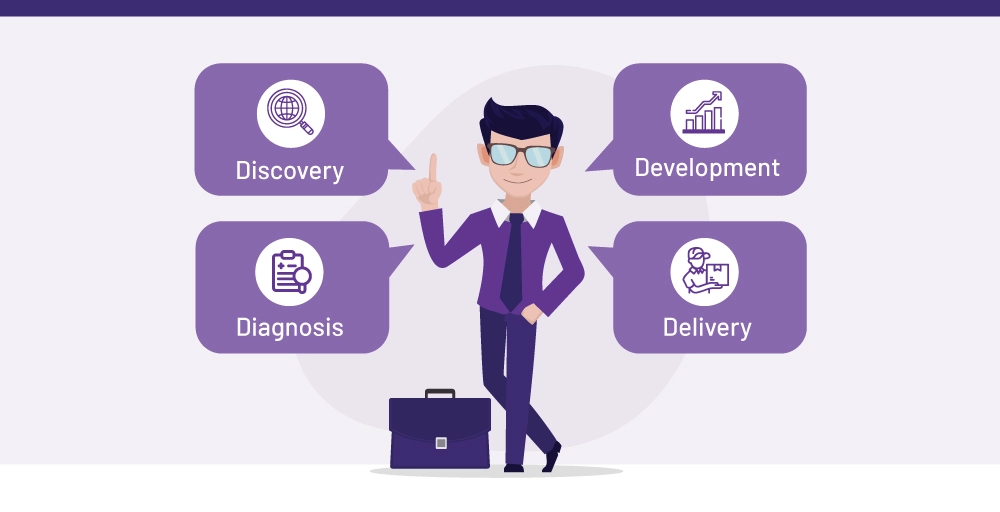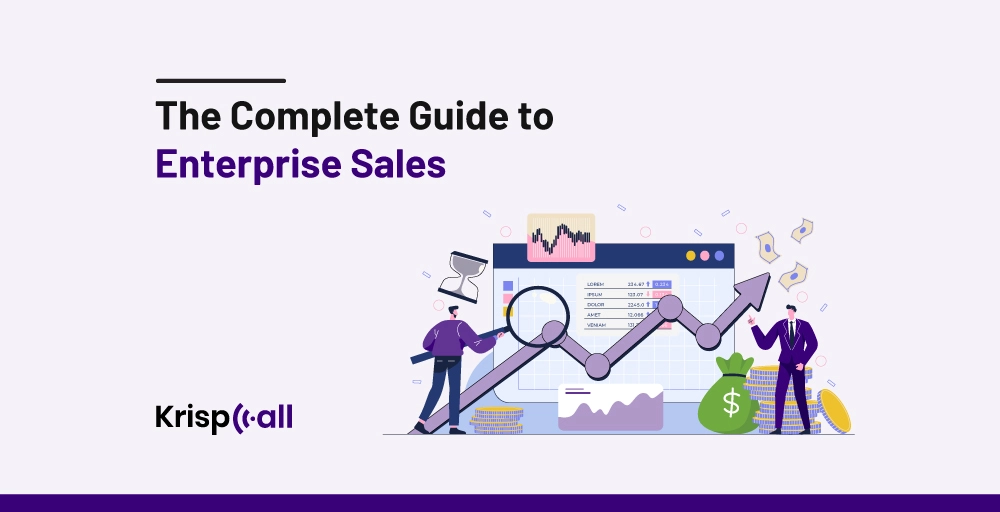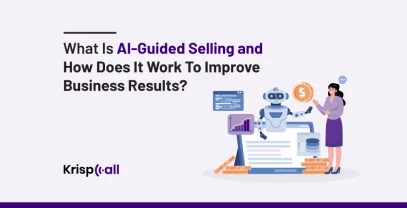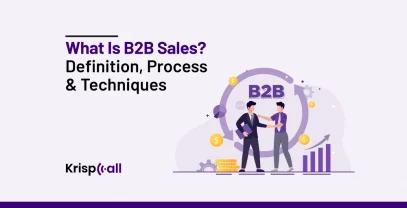Enterprise sales is a challenging and tedious process😓 as it needs a solid understanding of the target market, sales team, and effective sales process📊. If your strategy is not clear and unorganized, you might struggle in closing deals, building relationships🤝 and driving desired revenue.
So, to be successful in selling enterprises, there is a need to adopt the right aim of the market, the right sales model, and the right workforce.💼 With specific goals, companies will able to make improvements in deal progress, build strong relationships, and generate revenue for their growth and prosperity.
In this blog, we will explain enterprise sales in detail, their importance, the various steps of enterprise sales, a comparison with other sales models, and the process of creating an enterprise sales model. We also cover different strategies, tips, and FAQs related to enterprise sales.
🔑 KEY Summary
- Enterprise sales is the systematic approach that is used to provide business products and services to large and multi-location organizations.
- By implementing the right sales model, enterprises can sustainably grow and explore new markets.
- To build enterprise sales, you require 4 basic steps, i.e., Discovery, Diagnosis, development, and Delivery.
- To create an enterprise sales model you need to understand your customers, sales plan, train salesperson, set and track goals, and work together as a team for a better result.
- It is important to follow strategies like Knowing Your Buyer, Communicating Effectively, Onboarding Buyers, and Mapping the Company’s Internal Structure in order to master enterprise sales.
What is enterprise sales?
Enterprise sales are the strategies and processes used to offer business products and services to large, multi-location organizations that have enduring, drawn-out, multilevel decision-making processes and multiple contacts compared to the simple, one-level buying processes of SMBs.

Through the enterprise purchasing process leading to business-critical products and services acquisition, customers embark on an evaluation process inviting several vendors for tender and assembling a purchasing team comprising members from the organization’s various departments to professionally evaluate available options prior to making any decision.
Why is enterprise sales important?
For enterprises business that require sustained growth and exploration of new markets, the right sales model has to be implemented. If you align yourself with big companies, you can reap constant income and reject the widely claimed inadequacies of seeking new business while building the foundation for long-term growth and prosperity.
- Build brand credibility with world-class customers: Obtaining a partnership agreement with big-name players like Cisco, Apple, Disney, or HP can add credibility to the unit and the business enterprise, and the unit makes great strides forward.
- Kick-start your revenue with just a handful of well-executed deals: Enterprise selling strategies can also create a stable revenue foundation for B2B companies, which can increase through focusing on growing share of existing customers and offering new solutions.
- Deepen your relationships for the long haul: Enterprises deal with your company and respect the relationship that entails commitment with upselling, referrals, and active advocacy.
- Longer Sales Cycle: Another difficulty that comes with enterprise sales is the typically lengthy sales cycle, and the prospect can take as long as a few months up to years for one deal.
- Many decision-making makers: Another challenge currently faced in enterprise sales is when several decision-makers with different interests and agendas must be influenced and motivated, which can add time to deal cycles and increase the likelihood of renewed deals.
What are the 4 basic steps of enterprise sales?
Successfully navigating enterprise sales involves a structured process that ensures tailored solutions and strong client relationships.

Here are 4 basic steps of enterprise sales:
- Discovery: This is the initial phase where the sales team gathers information about the potential client’s business, needs, and pain points. This involves researching the company and its industry and identifying key stakeholders. The goal is to understand the client’s challenges and objectives thoroughly.
- Diagnosis: In the diagnosis phase, the sales team delves deeper into the client’s identified problems and opportunities. This step involves asking probing questions and conducting a detailed analysis to pinpoint the root causes of the issues. This phase is critical for building credibility and trust, as it demonstrates a genuine understanding of the client’s situation.
- Development: Development focuses on creating a customized solution that addresses the client’s specific challenges and goals. This involves collaborating with the client to design a tailored proposal, often including demonstrations, pilot programs, or prototypes.
- Delivery: Delivery is the final phase where the agreed-upon solution is implemented and executed. This step involves not only the physical or digital delivery of the product or service but also includes training, support, and follow-up to ensure successful adoption and satisfaction.
Enterprise Sales Model Vs. Other Sales Models: What’s the Difference?
For companies asking, “What does enterprise sales mean?” or wondering how it differs from other sales models, it’s simple:
Enterprise vs. Self-Service Sales
Enterprise sales need complex, high-value deals with multiple stakeholders and large corporations. In contrast, Self-service sales could be ideal if your company has a low-cost product with a low customer acquisition cost (CAC). It’s typically a high-volume strategy that lets customers complete the transaction process quickly.
How does it work?
Your business provides a self-service platform for customers. This is also where they sign up, buy, and reorder the products they need at their own pace. In this model, the customer does most of the legwork, and sales and customer support teams are less involved than in other models.
Self-service tools can include knowledge bases, help centers, and integrated chatbots to guide customers through the sales process and help them find answers to questions on their own.
Enterprise vs. SMB Sales
Enterprise sales focuses on a long-term solution that needs a strategic approach for a larger enterprise while SMB sales mean you’re selling to a small or medium-sized company. Most SMBs seek immediate solutions to their pain points rather than long-term effectiveness.
How does it work?
Your company builds a product that solves a common problem for a market segment. Your sales team then tries to get customers in that segment to use it. Reps typically work with a single decision-maker or a small team of stakeholders to close the sale.
Enterprise vs. Mid-Market Sales
Enterprise Sales requires various stakeholders, including directors, C-suite executives, finance, end users, and legal departments. In contrast, Mid-market sales involve director-level decision-makers, end users, and some individuals who have knowledge of legal matters or finances.
How does it work?
Your business develops a product or service that resolves common pain points, and your sales team targets a more significant customer segment that could find value in it. Your sales reps work with more extensive stakeholders to close the sale. This creates a longer sales cycle, as the customization requests and multiple stakeholders usually mean more people need to sign off on the deal.
How do you create an enterprise sales model?
Identify the industries and types of enterprises that align with your product or service offerings. Understand their needs, pain points, and purchasing behaviors to tailor your sales approach effectively.
- Understand Your Target Customers: Determine which industries and business entities are more suitable for your offerings. Determine how they select their purchases, needs, and issues so that you can engage with them sensibly.
- Describe Your Ideal Customer: Clearly describe to your target company what image it should portray to impress and suit your expectations. It would be important to define factors such as size, industry, geographical location, decision-makers, and likely expenditures within the following year. This lets you know who to market your products to and direct your sales towards those people.
- Create a Sales Plan: Explain how you will sell to these big companies and create a list of enterprises you want to target. Identify significant developments that require restarting, what an investor must achieve at each, and milestones that confirm that the process will be seamless.
- Hire and Train Great Salespeople: Look for salespeople who understand how to operate with large companies and instruct them to the rest of the team. The latter should be well-armed with interpersonal skills to influence people’s significant clients and negotiate sales. Continue imparting knowledge to them in a way that will help them remain competitive throughout your organization.
- Set Goals and Keep Track: Determine the measures to demarcate excellent and bad sales results. Then, how about coming up with workable goals and objectives for your team and monitoring their performance? Use that information to adjust and amend what will be done, to see what is effective or what will be done to improve things.
- Work Together Across Teams: Synchronise all the teams you interact with clients, including sales, marketing, product, and customer support. This means that they will need to communicate and coordinate with each other so that they can create the most favorable setting for customers.
- Keep Getting Better: Keep your finger on the pulse of the issue and actively pay attention to what consumers are saying. Make sure to focus on what is going on in the market you intend to operate in and the current performance of your sales. After that, have a plan for making changes and improvements, and then you can continue to develop yourself.
9 Sales Strategy Tips for Enterprise Sales
It is very difficult to increase enterprise sales, but with the right strategy, you can efficiently achieve the goals. Here are the Sales Strategies you can use to to boost your enterprise sales.
1. Build a Winning Sales Strategy
You should set clear objectives that should be both clear and quantifiable to your sales workers. So what you need to do is focus your efforts on the revenue-generating accounts that fit your product or service niche.
Moreover, ensure that you have facts approximately your competitors so that you can locate your product correctly. However, use of sales process optimization will mean better efficiency and reduced productivity.
2. Know Your Buyer
Identify your specific target markets and create your specific customer profiles based on their pain, their position, and their age. You can also gather considerable information about the actual customer’s requirements and issues to address through research.
Lastly, you can use the insights for personalized engagement and concentrate on customer relationships rather than one-off sales.
3. Use Case Studies to Leverage Past Success
To make your case study highly effective and persuasive, you should select the most suitable case study. Organizations should measure their successes in terms of data to ensure they meet organizational goals. Moreover, it is also equally useful to have charts, graphs, and infographics, which makes the data more presentable.
4. Communicate effectively
Communicating with clarity is a crucial aspect of sales; it doesn’t matter whether it’s a small business or a large corporation. On the same note, you wouldn’t offer gifts to everyone alike, and you wouldn’t pass the same message to potential customers without considering their individual needs and issues. Instead of talking about how great your product is, focus on how the product could solve distinct challenges faced by these clients.
Similarly, emails, calls, presentations, and even showing them how it works are all good ways to get your message across. In the end, the key is to make sure they really understand how your product can benefit them.
5. Support Buyers Through the Onboarding Process
For large firms, introducing a new product in the market comes with several demands that are usually considered overwhelming at the initial stage. Likewise, implementing solutions for enterprise clients may pose some challenges. To make things easier and help them get the most out of your product or service, assist them with specific services and support.
This could include in-depth training sessions, clear and detailed instructions, and access to helpful resources – all designed to empower them to use everything your offering has to offer. Likewise, keep the conversation going even after the sale. By checking in with clients regularly and addressing any concerns they might have, you can ensure a smooth onboarding experience.
6. Map the Company’s Internal Structure
When you’re trying to work with a company, it’s important to understand how that company’s internal structure works. Things like who is in charge of different departments and their respective responsibilities are some knowledge you must understand. This knowledge will help you identify the most appropriate individuals to engage with and also the right way to approach them.
Understanding the company’s internal structure is helpful When you want to get them to work with you or buy your products. Knowing this will enable you to focus on the relevant individuals in the right positions, which can make all the difference in your sales success. Therefore, mapping the company’s internal structure can go a long way.
7. Find Good-Fit Companies
While looking for companies to cooperate with, you need to search for those that are best suited to what you are offering. You have to do more than just target the biggest or most famous companies. However, you need to find those companies that match your product or service.
In order to determine this, you must consider the types of people these businesses usually employ or use for their services. From this analysis, you can determine what kind of customer they are and see if they would be interested in your product.
8. Book Multiple Meetings from One Meeting
When you first meet with a company you want to work with, don’t just try to close the deal right away. Instead, use that initial meeting to start a conversation and get your foot in the door. The goal is to get them interested enough that they’ll agree to meet with you again.
Also, bring more than one decision-maker into the company so you have a better shot at actually sealing the deal. They are more likely to agree at the end if you can get all of them to agree with what you are suggesting.
9. Give Your Account Executive as Much Information as Possible
When you’re trying to convince the company to test your product or service, make sure to provide the Account Executive (AE) with all the details required to carry out the demo. That means giving them details about pain points, competitor usage, and key decision-makers.
It helps to ensure that the whole interaction goes smoothly to make sure the company will realize that your product or service suits their requirements. Taking that extra time to set the demo person up for success can really have a significant impact on whether you get a sale deal or not.
Wrapping Up!
In order to master enterprise sales, the organizations have to be successfully able to market their products in the mass market among the large Buyers. Businesses should consider the diversity and the degree of present-day sales and marketing to individualized sales strategy and to attract the desired kind of clients.
This indicates the importance of improving the strategic processes of management and reviewing from time to time to capture emerging trends in the business environment. Meeting and treating customers with respect will establish your company as a reliable partnership and bring new means for development in the business.
FAQs
What is a typical enterprise sales process?
The enterprise sales process is a strategic approach to selling high-quality services or products to large corporations. It requires several stages, including discovery, examination, design, delivery, and follow-up.
How can a business generate leads for enterprise sales?
Enterprise lead generation requires a targeted approach. That requires identifying high-value accounts through ABM and industry trends
How important is relationship-building in enterprise sales?
Relationship-building is the cornerstone of success in enterprise sales. Relationship-building help establish trust and rapport which are crucial when dealing with complex deals with multiple decision-makers.
What role does technology play in enterprise sales?
Technology gives enterprise sales a powerful boost. CRMs automate tasks, freeing up time for relationship-building. Sales data empowers smart decisions and prioritizes leads. Cloud platforms ensure smooth communication and collaboration.
Likewise, technology personalizes content and uses sales intelligence tools to understand client needs better. While human connection remains key, these tech tools help enterprise sales teams work smarter, closing more deals.
What are the key metrics for measuring enterprise sales performance?
To measure the sales performance of your enterprise you must track key metrics like average deal size, win rate, and sales cycle length to understand efficiency. You should also track Customer Lifetime Value (CLTV) to gauge long-term client relationships and measure Customer Acquisition Cost (CAC) alongside CLTV to assess sales efficiency.





